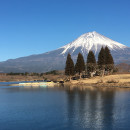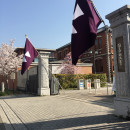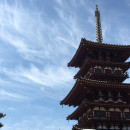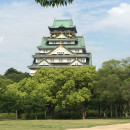4 Months That Will Last A Lifetime--In A Good Way:) Past Review
By Alana H (Japanese Studies, Brandeis University) - abroad from 01/03/2018 to 04/23/2018 with
Columbia University: Kyoto - Kyoto Consortium for Japanese Studies / KCJS
In terms of language, in addition to the standard Japanese we learn at our university in America, I was able to learn the regional dialect (Kansai-ben) as well as slang and idioms used by the younger generation. By visiting many places in and outside of Kyoto, I learned a lot about the history, geography, and local cuisine of Japan. From my elective classes (taught in English) I learned about the Japanese government and the history of Buddhism and its practices. Lastly, although I truly couldn't list all that I've learned in just one review, from my host family I learned about the character of the Japanese people--their work ethic, their opinions on various matters, their traditions, their struggles, and their immense kindness to both each other and to foreign students like me.
Review Photos




Personal Information
| How much international exposure did you have prior to this program? | 0-2 weeks |
Review Your Program
|
* Overall educational experience
Academic rigor, intensity, resources, etc. |
|
|
* Host Country Program Administration
On-site administration of your program |
|
|
* Housing:
How satisfied were you with your living arrangements? |
I did a homestay, and I absolutely loved my host family! All of my friends in the program who did homestay enjoyed their families too. |
| * Food: |
Doshisha University has excellent food |
|
* Social & Cultural Integration:
How integrated did you feel with the local culture? |
KCJS does a lot to help all their students get involved with the local culture, including field trips, lunch talks with Japanese students, and various local activities such as hiking and tea ceremony lessons. The also have a community involvement aspect to the curriculum to encourage connections with the local people. |
|
* Health Care:
How well were health issues addressed during the program? |
I didn't have any experience with the healthcare system personally while I was in Japan, but I know that KCJS provided assistance with arranging healthcare options for both physical and mental health concerns and they were very attentive and responsive towards student needs. I did not need any vaccines for this program. |
| * Safety: |
One of the biggest safety issues relevant to this program, since it is based in Kyoto, is bicycle safety due to the popularity of this mode of transportation. KCJS, in the first few days of orientation, provided its students with a bicycle and general safety course taught by the local police. I feel that Kyoto, and Japan in general, is an extremely safe place to study abroad and live, even as foreigner. |
| If you could do it all over again would you choose the same program? |
Yes
KCJS was so much better than I ever could have hoped. I was placed with the most incredible host family, with whom I still talk to frequently. The KCJS faculty and stuff were so kind and hardworking; they always did the best they could to give us a great experience abroad, both in terms of our studies and making sure we had ample opportunities to connect with the local community. Kyoto itself is a beautiful and historical city. Since it was the old capital of Japan, there many temples, shrines, palaces, and castles to explore. |
Finances
|
* Money: How easily were you able to live on a student's budget?
(1 = not very easy/$200+ on food & personal expenses/week, 2.5 = $100/week, 5 = very easily/minimal cost) |
I was fortunate to have received scholarships that relieved much of the financial burden that I would have experienced otherwise. I was also lucky to have been with a great host family who lived very close to my university, which meant that my food and travel costs were low. However, while Kyoto is a very walkable/bikeable city, traveling to other places via the shinkansen (bullet train) is very expensive. KCJS provides local travel reimbursements if you are placed with a host family who lives far away. |
| Not including program expenses, about how much money did you spend on food and other expenses each week? | Since I lived with a host family, I only had to pay for lunch or snacks, so I would estimate about $100 per week for food and local travel costs (I traveled a lot). |
| Do you have any general money-saving tips for future study abroad participants? | Walk everywhere you can! It's a beautiful city with temples, shrines, shops, and small cafes around every corner. |
Language
| * Did your program have a foreign language component? | Yes |
|
How much did the program encourage you to use the language?
0 = No encouragement, 5 = frequent encouragement to use the language |
KCJS is an intensive language program, so we spoke only Japanese in class and in the building where our classes were held. We also had weekly lunch talks with Japanese students where we spoke only Japanese. KCJS also has a language partner program, so we could use our causal Japanese with peers our own age. |
| How would you rate your language skills at the beginning of the program? | Intermediate |
| How would you rate your language skills at the end of the program? | Advanced |
| What was the highest level language course you had completed prior to departure? | Japanese 120A (advance intermediate) |
| How many hours per day did you use the language? | |
| Do you have any tips/advice on the best ways to practice the language for future study abroad participants? | If you have a host family, talk to them as much as you can (they will be excited to know you!:) Make Japanese friends and hang out with them outside of arranged program activities. Travel around the city and talk to local people (practice ordering food, ask for directions if you get lost, talk to shop staff about their products (especially omiyage), etc.) |
Other Program Information
|
* Where did you live?
Select all that apply |
|
|
* Who did you live with?
Select all that apply |
|
|
* Who did you take classes with?
Select all that apply |
|
| About how many local friends did you make that you will likely keep in touch with? |
A Look Back
| * What did you like most about the program? |
|
| * What could be improved? |
|
| * What do you know now that you wish you knew before going on this program? | I wish I had had more confidence in my Japanese so that I would have not have been afraid to make mistakes, and thus learn from those mistakes. I also wish I had been more committed to speaking Japanese, rather than speaking English when the other person happened to know English better than I knew Japanese. |








